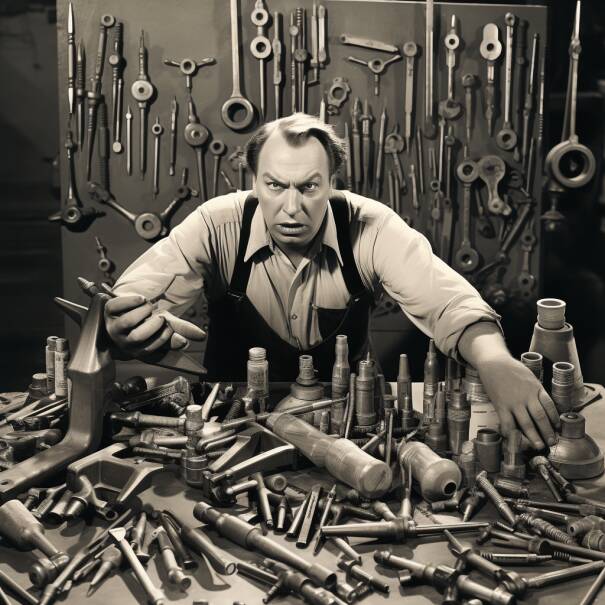Right To Repair Advocates Have A New Opponent: Scientologists

Right to repair advocates have made significant gains across the US of late, but the latest challenge to the movement faces a challenge from a surprising place: the Church of Scientology.
In a letter filed earlier this month with the US Copyright Office regarding its triennial review of Digital Millennium Copyright Act (DMCA) Section 1201 exemptions, Author Services, Inc., which represents "the literary, theatrical and musical works of [Scientology founder] L. Ron Hubbard," opposed renewal of a subsection of 1201 that allows consumers to circumvent software locks in order to repair their devices.
Section 1201 exemptions have been granted in a number of cases, including for the repair of John Deere commercial farming equipment, but it isn't those sorts of exemptions that Author Services has an issue with.
"We have no objection to the exemption as applied to … consumer devices to allow consumers to repair products on their own initiative," Author Services legal director Ryland Hawkins argued in the letter. Instead, Hawkins argues that some devices – unnamed in the letter – "can only be purchased and used by someone who posses [sic] particular qualifications or has been specifically trained in the use of the device."
In such cases, Hawkins argues, software licenses aren't unilateral, "but rather [are] negotiated and agreed to in advance of the purchase of the device.
"In many case [sic], such restrictions are essential to ensuring the safe and proper use of the device, which is essential for the device manufacture [sic] to maintain its reputation and goodwill."
The repair exemption rules that Hawkins refers to were changed in the last Copyright Office review in 2021, and loosened the law to allow tinkerers and security researchers to dig into copyrighted software without violating the DMCA.
Such exemptions, Hawkins argues, "might directly contradict the terms of the negotiated, pre-purchase license, undermining the businesses' ability to control their own reputation and that of their products."
Why does L. Ron Hubbard's literary estate care about this?
As mentioned above, Author Services makes no mention of what particular device requiring training and qualifications to operate that it could be talking about. We contacted Author Services to find out more about its letter and request, but haven't heard back.
Without knowing what exactly the letter is referring to from the prophet's mouth, we can still get there by connecting a few dots – first and foremost establishing that Author Services is a subsidiary of the Church of Scientology.
One of Scientology's subsidiaries is the Church of Spiritual Technology, which is described as owning the copyrights to all of Hubbard's works and responsible for licensing their use. As mentioned above, Author Services represents Hubbard's works.
Further, alleged excerpts from Department of Treasury documents from 1993 describe Author Services as being transferred to the sole ownership of the Church of Spiritual Technology. If that's the case, it'd mean Author Services is ultimately answerable to the main Scientology organization.
And Scientology is only associated with one electronic device: the infamous electropsychometer, or E-meter, which the church uses as part of its "auditing" process. E-meters allegedly "measure the spiritual state or change of state of a person" and are used to "locate areas of spiritual distress or travail."
We note that language in Hawkins' letter bears striking similarities to an agreement [PDF] from 2013 that Scientologists must sign in order to claim an E-meter, as leaked by Scientology whistleblower Mike Rinder.
- Remember Anonymous? It/they might be back, and it/they are angry with Elon Musk
- Millionaire-backed science fiction church to launch Scientology TV network
- We all scream for ice cream – so why are McDonald's machines always broken?
- After years of fighting Right to Repair, Apple U-turns-ish in California
So why are Scientologists so keen to keep the public from picking through their E-meter software? "My hunch is that the Scientologists think granting the hacking community permission to dig into their E-Meter software will expose the whole operation as snake oil," iFixit director of sustainability Elizabeth Chamberlain said.
"The request is like so many other anti-Right to Repair arguments: manufacturers are afraid that access to repair materials will expose some of their other dirty secrets," Chamberlain added.
Chamberlain expressed concern that, if the Copyright Office accepted Author Services' request for exemption, other companies could begin looking for creative ways to use that precedent to disrupt section 1201 exemptions too.
"I can imagine manufacturers using the presence of a 'quick start' guide for a product as evidence that their consumers are 'specially trained in use of the device' and thus denying broad access to repair," the iFixit director said.
Whether Author Services' request will succeed remains to be seen, but Chamberlain doesn't seem to think so: "It's a totally unreasonable proposal." ®
From Chip War To Cloud War: The Next Frontier In Global Tech Competition
The global chip war, characterized by intense competition among nations and corporations for supremacy in semiconductor ... Read more
The High Stakes Of Tech Regulation: Security Risks And Market Dynamics
The influence of tech giants in the global economy continues to grow, raising crucial questions about how to balance sec... Read more
The Tyranny Of Instagram Interiors: Why It's Time To Break Free From Algorithm-Driven Aesthetics
Instagram has become a dominant force in shaping interior design trends, offering a seemingly endless stream of inspirat... Read more
The Data Crunch In AI: Strategies For Sustainability
Exploring solutions to the imminent exhaustion of internet data for AI training.As the artificial intelligence (AI) indu... Read more
Google Abandons Four-Year Effort To Remove Cookies From Chrome Browser
After four years of dedicated effort, Google has decided to abandon its plan to remove third-party cookies from its Chro... Read more
LinkedIn Embraces AI And Gamification To Drive User Engagement And Revenue
In an effort to tackle slowing revenue growth and enhance user engagement, LinkedIn is turning to artificial intelligenc... Read more

